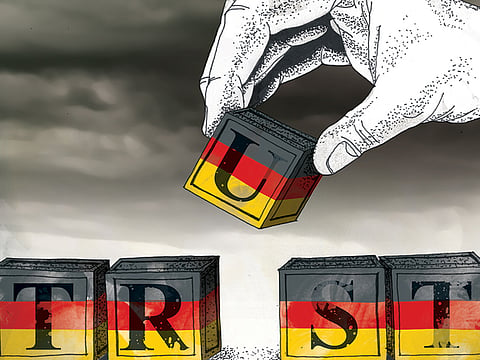Germany caught between two violent extremes
Rebuilding trust and fighting the rise of the new far-right starts with blunt honesty — investigating the backgrounds of all attacks without political bias

Four attacks in a week have left Germany anxious. On July 18, a teenaged refugee attacked passengers on a train near Wurzburg with an axe and a knife. Three days later, an 18-year-old shot and killed nine people in Munich. And two days after that, a Syrian refugee killed his girlfriend and co-worker at a kebab shop in Reutlingen, a few hours before another Syrian refugee detonated a bomb in Ansbach, killing himself and wounding 15.
In terms of motivation, the attacks came from all directions. The Wurzburg and Ansbach attackers claimed allegiance to Daesh (the self-proclaimed Islamic State of Iraq and the Levant), while the Munich killer said he wanted to copy the Norwegian right-wing extremist and mass murderer Anders Breivik.
All of this has Germans reeling. What kind of extremism poses the greater danger to Germany — Daesh or the German far-right? Are people in Germany safer as a globally engaged society or should they isolate themselves?
It has been a tough year for Germany already. After welcoming hundreds of thousands of refugees, Germany started 2016 with dozens of sexual assaults outside Cologne’s main train station on New Year’s Eve, followed a few months later by surprising gains by the anti-refugee, far-right Alternative for Germany party in state elections. And the past week’s events add to an existing climate of anxiety. Fear of terrorism was already at a high: 73 per cent of Germans surveyed in April and May said they feared terrorism — the first time the issue took first place on the list of Germany’s leading concerns since the survey began 20 years ago.
Though the Wurzburg attack came first, it was the Munich attack that changed everything. It took hours for the police to find the killer. Rumours flew of other attacks around the city; its 1.5 million residents were told to stay indoors; trains were diverted, as if Munich was under quarantine. That evening, the entire country was transfixed with fear, glued to their TVs or cellphones. The fact that the death toll stayed in the single digits is irrelevant; the experience, the collective fear, will stick with the people.
The Alternative for Germany party was quick to link the attack to Chancellor Angela Merkel’s open-door refugee policy. Last Friday night, long before the police had details on the Munich perpetrator’s motives, a party leader tweeted: “Merkel, thank you for terrorism in Europe.”
When the police did release more information on the gunman on Saturday, stressing that they could find no ties to terrorist groups, there was a strange feeling of relief in the liberal corners of the social networks: Thank God, it was just a shooting rampage! The far-right was wrong! But then a refugee detonated a bomb in Ansbach, and the narrative flipped again.
The only simple truth after a week of horrors is that there is no simple truth. And yet it will clearly alter Germany’s collective self-perception. People in Germany have joined the ranks of victims of international terrorism. The shell that seemed to protect Germany from the horrors experienced by others — by the United States and by so many countries in Europe, the Arab world and Asia — is broken, if it ever existed. In an odd way, it’s like a coming of age, a shedding of a child’s illusion of being inviolable.
Xenophobic violence
But perhaps more so in Germany than any other country in Europe, the fear of terrorism isn’t limited to the possible attacks themselves; it is about what the country’s far-right will do with it. Germany has already seen the political risks of xenophobia; the right-wing sentiments of the Munich attacker raise the possibility that xenophobic violence will escalate further.
What it all adds up to, though, is a fear that the attacks will change the character of Germany itself, destroying the tolerant, cosmopolitan identity that it has so assiduously built over decades and that it cultivates as if it were a prize flower. Given Germany’s history, it has always been aware of its fragility; but in recent decades, it has been more confident about its relatively new selves — even, dare one say, proud of what Germany is today.
Since the attacks, leaders from the centrist parties have been offering detailed suggestions for policy changes to counter terrorism, a desperate attempt to prove the ability of mainstream politics to respond. But however sensible their suggestions, none of them can compete with easy populist slogans like “No asylum for Muslims” or “Shut the borders”.
Rebuilding trust and fighting the rise of the new far-right starts with blunt honesty, investigating the backgrounds of all attacks without political bias, whether they are extremist or xenophobic. It also means being realistic: The only way to truly prevent such attacks is to renounce the freedom and openness that make modern Germany worth defending. Accepting that premise without accepting its conclusion is the greatest challenge facing Germany — and the West.
— New York Times News Service
Anna Sauerbrey is an editor on the opinion page of the newspaper Der Tagesspiegel and a contributing opinion writer.



